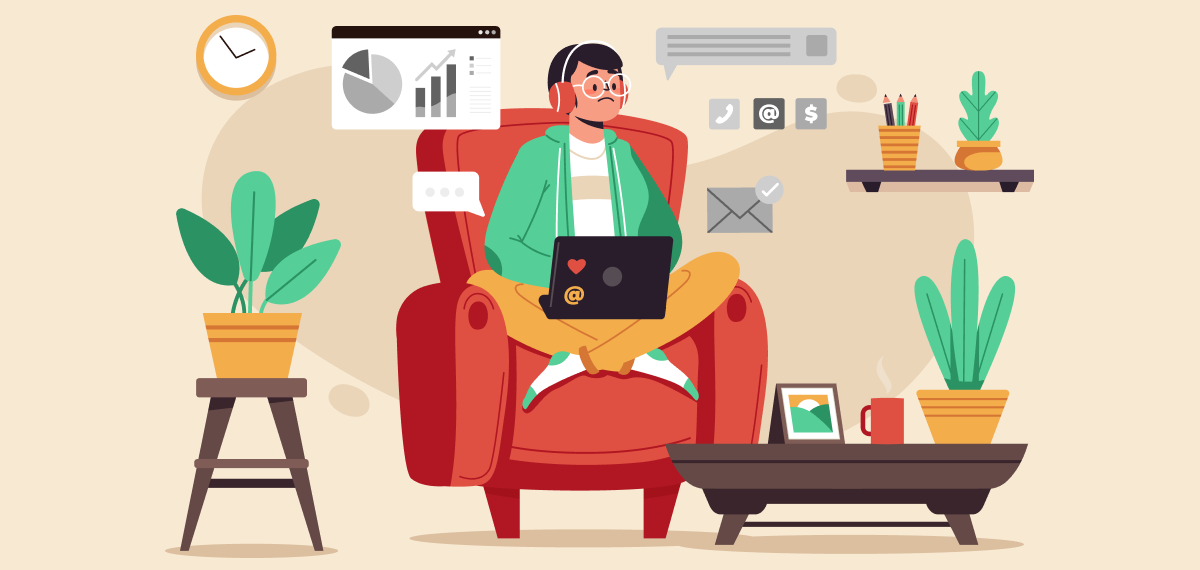Why work from home burnout is not a myth

Sam was lounging in his pajamas and sipping a mug of oolong tea while deep in thought — to lie or not to lie. It was 10 PM on a Sunday night and all he could think of was whether or not to take leave the next day or somehow just get through it.
It’s been four months since Sam has been working from home and he feels things have gotten a little stressful. The pile of dishes in the basin and PowerPoint presentations kept contesting for Sam’s attention. It was getting difficult to juggle both his personal and professional life. He lived with his partner but even so, the tasks just never seemed to end. He often compared himself to Sisyphus — entangled in an endless cycle of dishes, calls, moping, presentations, cooking, stand-ups, and so on.
Now he felt burnt out. His brain just refused to function, and each task seemed painfully slow. Sam felt he had been working on a shift of 20+ hours. The breaks were minimal and there simply was no ‘me time’.
He knew the company needed him now more than ever. His team, clients, as well as his partner needed him. What he also (desperately) needed was some time for himself, but he wasn’t able to prioritize it over the needs of others. He knew he needed to take a break, and he required one badly. He thought about what he could do if he took a break. He couldn’t go anywhere, or not do anything and just relax as he would on a vacation.
Most importantly, what would he tell his team at the office? He has been motivating his team and colleagues since Day 1 of the lock-down and he still motivates them. He wondered if telling his team he would be taking a break would mean he’s misusing his power, or that they would lose morale.
The only possibilities before him were to lie and tell them he had a family emergency or to honestly tell them he needed a week-long breather.
The options were simple enough — but he didn’t want to lie to his team and he didn't think he should take a break when they needed him. He was aware of the importance of mental health but his mind oscillated between all the ‘what ifs’— what if an urgent meeting with the clients goes south and they lose the client? Hundreds of questions pounded him, effectively worsening his mental state. It was already late and he had to email his team if he were to opt for a break.
Fast-forward to Monday 9 AM, Sam’s leading his team’s stand up call and attending back-to-back calls while helping with lunch prep and cleaning a few dishes. By 4 PM, he’s had a nasty argument with a teammate and a bitter fight with his partner. These infuriate him further, decrease his productivity, build conflict in his team, and disturb the peace in his personal life.

"It’s high time the myth of the perfect employee gets a reality check."
In the pre-lockdown era, managers were mostly worried about under-performance but post the lock down, over performance became a greater issue.
With most employees working remotely for the first time, the idea of separating personal and professional lives is almost non-existent. Both the spheres keep colliding with each other and before you know it, you are boiling vegetables while understanding client requirements over a call.
The lack or blurring of this boundary, albeit unintentionally, often leads to severe anxiety and stress in employees. The key is to focus on one thing at a time. Take in the aroma of sizzling garlic in olive oil instead of arguing over missed deadlines while cooking.
Though we all know that the ideal is rarely real. We struggle to try to live up to our ideal standards and inevitably fail. Working from home has been a boon in multiple ways like reduced travel time, escape from traffic stress, eating home-cooked food more often, and more. However, both our superiors and we often assume that the time and stress saved on travel can be effectively utilized in working harder.
According to Kaspersky's report, 31% of workers said they are working more than what they did in the office before COVID-19.
This has resulted in severe burnout, and as we see in Sam’s case as well, almost all of us are either ashamed or guilty over day-offs while working remotely. We have almost internalized that working from home is a huge favor that our respective companies have bestowed on us and we would rather work through 30-hour shifts than take a break.
As per the new research commissioned by Panadol, 35% of workers feel scared to take sick leaves while working from home, and 51% admit to increased stress and more struggle to get work done while 68% of workers find it difficult to switch off from work, quotes Yahoo Finance.

But as we are drowning in home and office work, it’s not easy to spot our tolerance threshold. We might be toying with the idea of a casual leave but the true realization of our situation might not sink in until our pent-up stress leads to conflicts in both our personal and professional lives.
It is very important to note that both physical and mental distress influences this burnout. Although most of us are acclimatizing to the idea of mental hygiene, we don’t always prioritize it. The fear of losing one’s job over under-performance is too great to allow us to pause and breathe. Here are some signs we need to spot early on before we run into bigger damage we have to fix:
- Piling tasks
- Eternal fatigue
- Depersonalization
- Avoiding delegation
- Loss of perspective
- Emotional exhaustion
- Hooked to official communication platforms
The fear of the pandemic coupled with our fear of losing our jobs is a unique situation that is taking a toll on both our mind and body. Once we recognize these signs of burnout in ourselves or someone else, we need to take a break immediately. “After I finish this task,” or “once I am done with this” aren’t great replies to the realization that you are burnt out.
Here are a few suggestions that might help those who are looking for ways to avoid WFH burnout and lead more balanced lives:
- Create physical boundaries between work and personal life
A home office is not just a fad, it's a need. Creating a physical workspace at home allows us to prepare ourselves mentally as we enter the work zone. Our home office could be just one corner of the dining table or an entire room. What’s important to remember is that we are in work mode once we sit on our work chair and switch off work mode when we are off it. The physical act of sitting and getting up from our designated workspace helps us break from feeling like work mode is always on.

- Stop procrastinating and stay realistic
We tend to get distracted very easily now. We might be researching for a meeting and somehow land on funny videos that take up a lot of our time. Staying focused on the tasks at hand has become quite difficult now as our bodies keep looking for escapes from the drudgery of everyday routine.
One way to avoid such distractions is to set realistic goals and time ourselves in finishing the task at hand within that time. We shouldn’t be vague about timelines even while making mental notes of our day’s work. Be clear and dedicate an approximate amount of time that the task might require. For example, if fixing a bug would take you around forty minutes, then do not keep postponing the task. Do it within those forty minutes so you can move onto the next task.
- Prioritize correctly
We often tend to get confused over picking tasks when we have multiple tasks for the day. Now that we have to divide our time between household chores and office tasks, we need to realize that skipping a meal is more dangerous than a late email.
Prioritizing our health first and then moving on to the most important office tasks should be the route. However, that doesn’t mean we take longer lunch breaks when urgent tasks are pending. We should finish office work as quickly as possible within our timelines and take things slow in our personal life. This might help us differentiate between the two spheres and help balance our lives.

- Mix up your day
Following a routine might be a good idea to keep things in order but the same routine day in and day out could dampen your spirits. The wise thing to do is to keep a flexible routine. Maintaining strict schedules is tough and the pressure of following them without fail sets unrealistic expectations for us.
The key to a more balanced and stable life is to add things or hobbies that we enjoy outside work. Adding such hobbies or passion with our normal routine will definitely help us. Take the case of people who started personal blogs to share their passion with the world since the lockdown started. They don’t make entries every day but only weekly or whenever they feel a surge of inspiration within them.
Apart from that, take the time to connect with those close to you or just take a walk in the garden to break the momentum of work.
Most importantly, don’t let others dictate your WFH experience. Do take suggestions but you need to explore what works for you. Just be mindful of not letting your work overdrive your life; take regular breaks to enjoy the little things in life.



